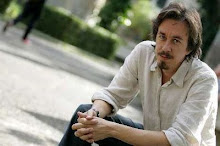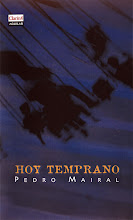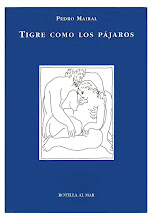by Marvin Kleinemeier for wilde-leser.de, 2010
Please tell our readers a little bit about yourself! Who are your influences? How did you start writing? What are your working habits?
When I was dropping out from University, I didn’t dare to tell my parents (I was 18 and I thought I wanted to be a doctor), so I pretended I went to my classes, but went to the cafeteria all morning instead. I read a lot and started writing my own stuff. I remember reading for the first time in a different way, reading short stories like when a kid opens a toy to see how it is made. I read Cortázar, Borges, Salinger, trying to find the hidden tricks. Before that I was more of a poetry reader. So my other influence comes from poets like Neruda, Vallejo, Dylan Thomas.
About my working habits: At the beginning I was able to write poems on notepads on the bus, but then I needed a computer and complete silence to write prose. Nowadays I need deadlines to deliver my work: columns for newspapers, articles, short stories for magazines, and scripts... I only write when I’m about to lose one of my many jobs.
You are said to invent and develop some of your characters online by using them in social networks and forums! Is that true? If so, how do you do that exactly?
I invented a character who wrote porn-sonnets. And, also under a false name, I used to write in a blog as a woman. It was a very interesting exercise because nobody knew it was me, so I had to maintain the illusion, or the deceit. Some guys wanted to meet me. I never answered. My character even published a short story in an anthology of Argentine women writers. But writers have been this since Euripides. I think the last chapter of James Joyce's Ulysses, Molly Bloom's monologue, is the best example of this cross-dressing literature.
Can you imagine someday leaving the novel behind and writing completely in a digital form?
In a way, I’m already doing that now. My next book is called "The novel I’m not writing". But I don’t have that need to burn down the house. May be I will go back to the novel soon.
In August, your second novel in Germany will be published, almost 10 years have passed between the releases. What has changed? In your life and your literature?
The world has changed a lot in ten years. Today writers write on-line, getting high with broadband injected into their veins. I’m writing a lot on blogs and websites, thinking about the concept of literature in a different way. Since 2005 I’ve been publishing almost everything on-line, except my novels: short stories, poems, articles... And I’ve been mixing all that with videos and pictures, and collages, and even music sometimes. Words are always the most important way of communicating for me, but I realize that with internet literature atomizes in many directions, it becomes a little more anonymous, and faster, shorter. For me, the best part is that people don’t think that writing online is making literature, so they generally write in a much less structured way, more fluently and naturally. I hope that doesn’t change.
Your first Novel "One night with Sabrina Love" won a "Best novel" prize and got turned into a movie. How is your feeling about the novel now and what sparked the idea of that novel?
The novel was adapted for the screen, and translated into six languages. I like "One night with Sabrina Love". Its one of those stories that have their own life, their own strength. I feel it almost doesn’t belong to me anymore. It’s a short novel or a nouvelle, as they call it, about a teenager who wins one night with a porn star. The idea came to me when I was watching a TV show about a beautiful hostess doing one of those raffles or ballots, where you could win two tickets to the Caribbean. My hormonal thought was: she should raffle one night with her. Then I thought that would only be possible if she were one of those porn stars who have cable TV programs. After some time I realized there was a story there if the winner of one night with the porn star was a virgin teenager who lived far away in a small town. That was the story: a teenager seeing the TV program where he wins the raffle, then the road-movie trip hitch-hiking to the capital, then meeting Sabrina Love and the big city. When I saw that in my mind, I knew I had something to write about. It’s a bildungsroman.
Reading your novels, one thing that really stands out is your ability to leave blank spaces to be filled by the reader. How important are the things that you don't say for your novels and your writing process?
I believe in leaving an empty chair for the reader. I don’t like to explain everything. I think the reader finishes the story, makes it up in his or her head. There is a drawing by Picasso where he shows a flower-vase. But only one of the flowers is fully depicted, the rest are just doodles or scratches. As a viewer you make it complete in your head, you see all the flowers, the flower vase happens in your head. You are in a way the author of it. But in order to do that, you have to trust the reader. If you patronize him or her, showing him or her where the deep parts are, or the meaningful stuff is, you push him or her aside.
Argentina will be the Special Guest of this year’s Frankfurt Book Fair. What do you think about this? How is this invitation received in Argentina? And will you be visiting Germany for the fair?
There has been some controversy about the Argentine organization that put Evita, Maradona, Gardel and Che Guevara as the national cultural icons for Frankfurt Book Fair. After receiving criticism and pressure, they added Borges and Cortázar. Apart from that, it is a good opportunity for many Argentine writers to show their work and for Argentine publishers to take authors who are not yet well known outside Latin America. I hope to be visiting Frankfurt.
What do you think is the typical stereotype of an Argentinian in Europe today? How does it differ from Buenos Aires in the 2000`s?
I’m not sure what the typical stereotype of an Argentinian in Europe today is. But I’m sure it’s quite accurate.
Where do you see yourself in the context of Argentine literature?
I see myself as part of a generation that has no manifesto in common, no fear in messing around with technology. I see the new writers appearing and I start feeling kicked out of the “young writer” spot where I used to belong. I like and I need to read people my age and younger, to see what they are doing. Borges said that no one wants to owe anything to his contemporary fellows, but I do, I owe them a lot. I have a strong influence from other writers my age because I have always been a bit old fashioned, from another era, or at least that’s how I felt. Reading contemporary poets and novelists keeps me awake. I want to see how they write about these times we are living.
We at wilde-leser.de discuss the novels of Roberto Bolaño in much detail. What do you think about him? Is he of any importance for your writing?
I consider Bolaño not as a fatherly literature figure, but rather as an uncle. A literary uncle. I like the way he thought of Latin-American literature. I particularly like El gaucho insufrible and Los detectives salvajes. He was one of the first writers to write about a literary generation in Los detectives salvajes. I’m interested in the way he writes about Mexico, and the way in which he saw the obscure forces that acted in Chilean culture.
In your novel "Salvatierra" that will be published in Germany soon, you write about a very romantic type of artist. A painter who paints his life on kilometers of canvases, without getting recognition for it. Reading the novel one could find many parallels to existing artists (especially Bolaño in many details of the novel) Was there a real life role model for the character of Salvatierra? Or perhaps several?
Juan Salvatierra is someone I would like to be, an artist who doesn’t need recognition at all, he can paint his whole life just for the fun of it and the joy of doing it. His endless painting is in a way an autobiography where he himself is not present. But I’m not like that. I need feedback, and I am glad when recognition comes along once in a while. With a group of poet friends of mine, we are working to bring to light the complete work of a poet called Cesar Mermet, who didn’t want to be published during his lifetime but never stopped writing. He was a genius. Maybe some of his attitude towards the public life of an artist is in my character Salvatierra. At least I hope it is.





